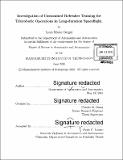| dc.contributor.advisor | Charles M. Oman. | en_US |
| dc.contributor.author | Geiger, Lynn Marie | en_US |
| dc.contributor.other | Massachusetts Institute of Technology. Department of Aeronautics and Astronautics. | en_US |
| dc.date.accessioned | 2016-12-05T19:55:01Z | |
| dc.date.available | 2016-12-05T19:55:01Z | |
| dc.date.copyright | 2016 | en_US |
| dc.date.issued | 2016 | en_US |
| dc.identifier.uri | http://hdl.handle.net/1721.1/105614 | |
| dc.description | Thesis: S.M., Massachusetts Institute of Technology, Department of Aeronautics and Astronautics, 2016. | en_US |
| dc.description | Cataloged from PDF version of thesis. | en_US |
| dc.description | Includes bibliographical references (pages 83-85). | en_US |
| dc.description.abstract | As humanity prepares to break the bonds of Earth's orbit and send explorers deeper into the solar system, mission duration will drastically increase; forcing crewmembers to retain skills and knowledge from prior training on Earth for unprecedented lengths of time. Since performance generally diminishes when a skill is unused, the development of efficient and effective refresher training is essential. The effectiveness of training presumably can be increased by taking into account the learning style of the student and customizing training or retraining material. To understand the effect of customized retraining material on skill reacquisition, we compared space telerobotics performance post training and six months later using two refresher training regimens: written refresher material and personally customized refresher videos. Videos were created by the subjects after training was completed. We used a simulator of the ISS Robotic Arm as a complex task, which requires intricate bi-manual control as well as adherence to complex procedures. We compared performance change between the two retraining styles using subjective instructor evaluation as well as quantitative performance metrics. We assessed each subject's Felder-Silverman Index of Learning Style (ILS), and developed an analogous rubric to assess the teaching style of the refresher videos. We found weak correlations between learning and teaching metrics in 2/4 dimensions. We also found metrics of a subject's spatial abilities (MRT and PTA, with p-values <0.005) predicted performance and retention in procedurally complex tasks. Spatial ability had more effect on the control group's retention than those who received customized retraining. Results of this study will be used to inform NASA on the appropriate refresher materials for long-duration spaceflight crews. | en_US |
| dc.description.statementofresponsibility | by Lynn Marie Geiger. | en_US |
| dc.format.extent | 175, 3 pages | en_US |
| dc.language.iso | eng | en_US |
| dc.publisher | Massachusetts Institute of Technology | en_US |
| dc.rights | M.I.T. theses are protected by copyright. They may be viewed from this source for any purpose, but reproduction or distribution in any format is prohibited without written permission. See provided URL for inquiries about permission. | en_US |
| dc.rights.uri | http://dspace.mit.edu/handle/1721.1/7582 | en_US |
| dc.subject | Aeronautics and Astronautics. | en_US |
| dc.title | Investigation of customized refresher training for telerobotic operations in long-duration spaceflight | en_US |
| dc.type | Thesis | en_US |
| dc.description.degree | S.M. | en_US |
| dc.contributor.department | Massachusetts Institute of Technology. Department of Aeronautics and Astronautics | |
| dc.identifier.oclc | 962488572 | en_US |
